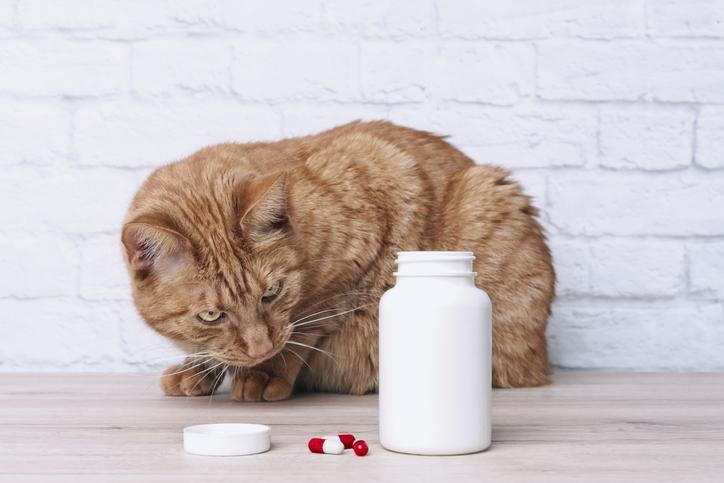Febantel for Cats - Uses, Dosage and Side Effects



See files for Cats
Febantel is an antiparasitic drug that is often used in combination with other antiparasitics such as praziquantel or pyrantel. When establishing a deworming schedule for your cat, the veterinarian will need to assess their specific needs. These will be determined by your geographical location, but also by age, lifestyle and other factors. However, not all parasitic drugs are effective as preventive dewormers. While they may not have particularly effective prophylactic capabilities, dewormers such as febantel can be very useful in fighting an active infestation.
At AnimalWised, we look at febantel for cats, specifically its uses, dosage and side effects. We will also help determine if it is a good option for your cat, a decision that must be discussed with your veterinarian.
What is febantel for cats?
Febantel is a broad-spectrum antiparasitic drug. This means it is active against different types of parasites, such as gastrointestinal nematodes or cestodes. These are types of internal parasites which can infect cats, as well as dogs, horses and other animals. On a chemical level, it is a benzimidazole with nematicidal and cestodicidal activity. This means it has the ability to kill these roundworms and tapeworms, respectively.
Benzimidazoles also include mebendazole, albendazole and a long list of others. They have been used in animals since the 1960s when they began to be administered to livestock. They were specifically used against adult nematodes and their larvae. Over the years, these products also achieved effectiveness against possible inhibited larvae, nematodes that parasitize the lungs and cestodes.
That febantel is a benzimidazole means that is transforms in the body into benzimidazole shortly after administration, especially in the liver. This is the active compound which is functional against parasites. In this way, febantel is transformed into fenbendazole.
How does febantel for cats work?
Febantel for cats works by altering the functioning of the parasite's digestive system. This ultimately causes its death. This dewormer does not have a residual or preventive effect. This means it will kill only the parasites that are currently infesting the cat and will be excreted in feces or urine. In other words, febantel will not protect the cat against future parasites that it could come into contact with later
As we mentioned, it is common to find it in combination with other antiparasitic drugs, which increases its spectrum of action. These include the following:
- Praziquantel: febantel is frequently combined with praziquantel to target tapeworms (e.g., Dipylidium caninum and Taenia spp.). This combination is effective against both roundworms and tapeworms, providing comprehensive deworming coverage.
- Pyrantel pamoate: febantel may be combined with pyrantel pamoate to address roundworms, hookworms, and whipworms. This combination is particularly useful for broad-spectrum deworming in dogs.
- Milbemycin oxime: in some formulations, febantel is combined with milbemycin oxime to target not only roundworms and tapeworms but also heartworms and other parasites, offering a wide range of protection.
- Emodepside: febantel can also be found in combination with emodepside for treating certain parasitic infections in cats, including roundworms and hookworms.
Febantel for cats uses
Febantel is used against different internal parasites in cats. Although most associated with the gastrointestinal system, they can affect various tissues in the cat's body. The parasites they are used to treat include:
- Hookworms
- Roundworms
- Whipworms
- Tapeworms
A veterinarian can recommend febantel if they diagnose our cat gastrointestinal or pulmonary nematodes, as well ascertain cestodes. This diagnosis can be made by directly observing parasites in feces or vomit or by observing under a microscope or analyzing a fecal sample.
Febantel for cats is not usually prescribed as part of the regular deworming schedule, which is usually established every 3-4 months. This will depend on the characteristics and living conditions of the cat. Not being used as a type or preventive dewormer for cats means it is similar to other deworming agents such as Panacur for cats.

Febantel dosage for cats
Febantel in cats is always administered orally. The dose will be determined based on the presentation of the product chosen, since febantel is marketed in both tablets and oral suspension. The weight of the cat is also a significant factor, so it is important to know this information as accurately as possible . This will avoid both overdosing and underdosing the cat. If we do the latter, the lack of effectiveness will make the administration redundant.
Febantel can be given to the cat directly in the mouth, preferably after eating. If handling is difficult, it is possible to mix febantel with food. In fact, it is though that mixing into food improves its bioavailability. In this case, correct intake must be monitored, since not all cats accept foods with medications mixed into them. Depending on each case, as well as the product chosen, the veterinarian will determine the most appropriate administration recommendations. Treatment may need to be repeated.
Since febantel is not a good product for preventing parasitic infestations, you will need to use other products for this purpose. Learn more with our article on the importance of deworming animals.

Contraindications and side effects of febantel for cats
Febantel is a safe antiparasitic that will kill parasites without causing harm to our cat. This is as long as we respect the administration guidelines prescribed by the veterinarian. It is rare for this drug to cause poisoning in felines thanks to its low toxicity and high safety margin. This means that the dose would have to be enormous to produce any adverse effects. If adverse side effects of febantel for cats do occur, they may include:
- Hypersalivation
- Diarrhea
- Vomiting
- Loss of appetite
In these cases, you must notify the veterinarian who will likely recommend you start symptomatic treatment. Even if the dosage is respected, some cats may vomit after administration of febantel or present mild diarrhea. The veterinarian will also have to be informed. It is also possible the diarrhea and vomiting in the cat is caused by another issue such as the infestation itself.
Finally, febantel is not recommended for pregnant cats or for kittens weighing less than 1 kg. Cats that are nursing their babies can use febantel.

This article is purely informative. AnimalWised does not have the authority to prescribe any veterinary treatment or create a diagnosis. We invite you to take your pet to the veterinarian if they are suffering from any condition or pain.
If you want to read similar articles to Febantel for Cats - Uses, Dosage and Side Effects, we recommend you visit our Medicine category.
- Carlson and Giffin. (2002). Practical manual of canine veterinary medicine. Madrid. Editorial Drac.








